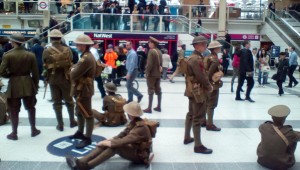Today marks the 100th anniversary of the first day of the Battle of the Somme. On this day, over 100 years ago, around 20,000 British soldiers died. By the end of the battle in November 1916 there had been over one million casualties on both sides for little military gain. Sadly this high number is not unique and other battles during this conflict, and other conflicts in later years, have surpassed this number.

The 1st July 1916 nevertheless stands as an important symbol of the massive loss of life during the First World War. That is why there are many commemoration services taking place around the country today. One of the worst tragedies of a terrible century of conflict, its anniversary allows us time to pause and reflect on war’s destruction.
Several writers explored their feelings of the conflict in poetry and prose:
- Siegfried Sassoon’s poetry has become synonymous with war poetry. A fascinating individual who was both an outsider and part of the social elite. His poetry displays a sardonic bitterness at the loss of life and the incompetence of the generals waging it. In 1917 he wrote a letter to The Times against the war.
- Wilfred Owen did not fight at the Somme in 1916, but his poetry depicts the deep tragedy and futility of the war. He wrote in a draft preface that “all a poet can do today is warn”. Tragically he did not survive the war dying the week before its end. His poetry was set to music by Benjamin Britten in his great “War Requiem”.
- Pat Barker’s Regeneration depicts the work of psychiatrist WHR Rivers, who treated soldiers with post-traumatic stress disorder during the war. Both Wilfred Owen and Siegfried Sassoon, who were treated by Rivers, are characters in this book. A great book, it explores themes of sexuality and identity.
- Owen Sheer’s Resistance describes a counter-factual history of World War 2, much like Amazon Prime’s popular Man in the High Castle series. There is a cameo in his book by David Jones, artist and poet, whose epic war poem describing his experiences during the Somme, In Parenthesis, was called by TS Eliot “a work of genius” and by Auden as “the greatest book about the First World War”.
- Blackadder Goes Forth’s moving final episode for many people sums up the futility and tragedy of war. The army’s generals are represented as class-ridden and incompetent with no strategic oversight. Some modern academics have argued the situation was more complex than this. Indeed, leading Brexit campaigner Michael Gove argued that the “Blackadder myths” meant that the War was “misrepresented”.
Reading, watching and responding to the artworks inspired by the war must make us realise how terrible war is and how important it is to seek peaceful forms of international co-existence. In today’s post Brexit world this is more important than ever.
See more poetry from CityLibrary Search: